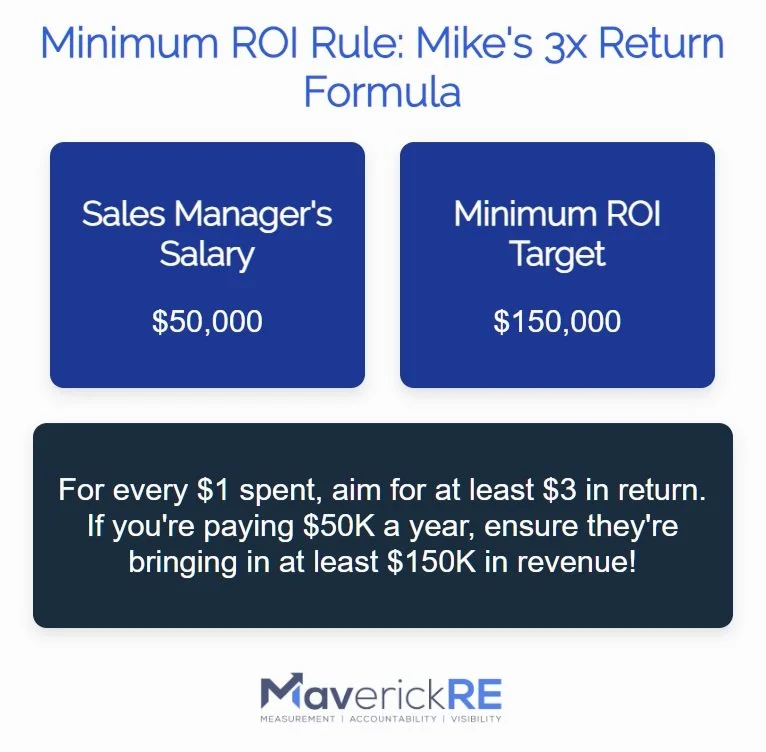How Do You Measure a Sales Manager's Value and Calculate ROI
Some teams hire sales managers without really thinking about how much value they bring.
Mike Schumm from Profytz Coaching has it figured out.
He says,
"Any expense of that, I believe the most important thing the team leader has to be responsible for is capital. You have a very finite amount of capital. So whenever you deploy capital, I don't care if it's for leads or it's to bring in a sales manager, which we're talking about here today, there has to be an ROI."
Let's break it down.
You're spending money on this person, right?
So you need to make sure they're actually helping your bottom line.
It's all about the profit.
Setting a Minimum ROI
Mike's got this idea.
He says you should aim for at least 3 times the return on what you're spending.
So if you're paying your sales manager 50 grand a year, they better be bringing in an extra 150 grand to your bottom line.
That's how you know if they're really pulling their weight.
Using Numbers to Your Advantage
You can't just guess if your sales manager is doing a good job.
You need cold, hard data.
Mike emphasizes using dashboards and software like MaverickRE to track everything.
You want to look at:
Leading indicators
Lagging indicators
How each agent is performing
That way, you can see exactly where your sales manager is making a difference.
What Really Matters: The Big Three
Units Sold Per Agent Per Month
This one's huge.
Mike says the average has dropped dramatically lately.
We're talking 0.7 units per agent per month now, compared to 10-12 in their first year and 20-24 in their second year back in the day.
A good sales manager should be pushing those numbers up.
Price Point
Your sales manager can really make a difference here.
If they can get your agents focusing on higher-end neighborhoods, even a small bump in average price can make a big impact.
Mike says just $10,000 to $20,000 more per sale can add up fast, especially if you're doing hundreds of deals.
Keeping Agents Happy While Hitting Company Goals
It's a balancing act, right?
Mike nails it when he says, "You always want the agent to feel like you're here to help them more than the company."
If your sales manager can help agents make more money, everybody wins.
The Listing Agent Game
Listing agents are where it's at right now.
Mike's not kidding when he says "listing agents control the market."
And with commissions changing all over the country, listing agents are getting a bigger piece of the pie.
So if your sales manager can train your team to snag more listings and negotiate better commission splits?
That's money in the bank.
Streamlining Your Team
Here's the interesting part.
If your sales manager can nail those three things we just talked about - more units per agent, higher price points, and more listings - you might not need as many agents on your team.
Mike puts it this way: "If you can increase those top three I just mentioned, you don't need nearly as many agents to create the GCI (Gross Commission Income) to hit the goal."
You could end up with a leaner, more profitable machine.
Managing vs. Selling: The Big Debate
This is something you really need to think about.
Should your sales manager be out there selling too?
Mike's got some interesting thoughts on this.
He talks about his time at Douglas Elliman, where they let managers choose between selling and managing or just managing.
And you know what happened?
Almost every time, those managers ended up focusing more on their own deals over time.
Why?
Because they could make more money that way.
But here's the thing - that's not always what's best for the team.
Mike lays it out straight: "I want the sales manager to be able to go on appointments. Maybe there's a couple of deals a year sphere or something they manage, but I would not have your sales manager managing their own sales pipeline."
His point?
You want your sales manager 100% focused on making your team better, not chasing their own commissions.
So there you have it.
If you want to know if your sales manager is really earning their keep, you have to look at the numbers.
Ask yourself:
Are they boosting your team's performance?
Are they helping you make more money overall?
That's how you figure out if they're worth the investment.
A good sales manager should be all about making your team stronger, not just padding their own wallet.
The Trouble with Sales Managers Who Sell
A Common Scenario
Mike tells this story:
"Your sales manager, they plan the big office training for Friday, right? We're going to go over, you know, something important. And the night before they get a million dollar listing opportunity, right? "Hey, the only time I can meet you, sales manager, is on Friday. I'm in town for one day for a million dollar listing appointment." Which one do you think he's going to reschedule?"
You can bet that million-dollar listing is going to win out over team training.
Trust is Everything
Your agents need to believe in their sales manager.
If they see that manager always putting their own deals first, that trust disappears.
Mike warns:
"Once you start doing that, you lose a lot of confidence in those agents following you."
You want a leader who's all in for the team, not someone who's got one foot out the door chasing their own commission.
The Money Problem
You might be thinking:
"How am I supposed to pay a good sales manager if they can't make some extra cash on the side?"
It's tempting to offer a base salary and let them make up the rest with their own deals.
But that's a trap.
It just pushes them to focus on their own pipeline instead of helping your team.
Mike's got a better idea:
Set up their pay so it's tied to how well the team does overall.
Give them a solid base salary, sure, but make their bonus depend on the team's success.
That way, they're motivated to make everyone better, not just themselves.
Wrapping It All Up
How do you know if your sales manager is worth what you're paying them?
You've got to look at the big picture:
Set a minimum ROI
Use tech to track all those important numbers
Focus on the stuff that really moves the needle:
Deals per agent
Higher prices
More listings
Key Points
Make sure your sales manager is spending their time managing, not selling.
Build that trust with your team by showing the manager's got their back.
Structure their pay so they win when the team wins.
Mike says:
"If you're not getting an ROI, you didn't hire the right person, in my opinion."
You want a sales manager who's going to boost your whole team's performance and bring in way more than what you're paying them.
Do it right, and you'll see your team grow and your profits soar.





